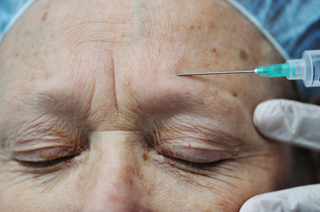
Although millions of people receive Botox injections to reduce the lines associated with natural aging, multiple studies suggest these seemingly harmless wrinkle-reducing shots may impact brain health.
For instance, some research shows Botox manages to make its way into the central nervous system.
Additionally, studies on rat found that when the active ingredient in Botox was injected into one side of the brain it could be found on the opposite side of the brain. Even Botox injected into the rats’ whiskers showed up in the brain.
Although these studies used more potent, purified forms of the toxin and not the diluted form found in the cosmetic injections, its ability to travel into the nervous system raises concerns nevertheless.
Botox affects brain signals from hands
A Swiss study on humans also found Botox affects the areas of the brain associated with the hands. This is because the face and the hands occupy areas of the brain that neighbor one another. The researchers found that the paralyzing effect of Botox on the face inhibited sensory input to the brain in this area, thus altering brain mapping of the hands.
Researchers theorized that loss of movement in the face caused by Botox injections could affect touch sensation in both hands. They called for further studies to determine whether Botox also affects other parts of the body.
Botox impacts the brain’s ability to read facial expressions
The human brain is highly adept at reading and responding to facial expressions — it is primary to how we communicate. We instinctively mimic facial expressions in one another as a way to understand, communicate, and empathize. However, Botox erases this vital aspect of communication by paralyzing facial muscles. Researchers believe this inhibits the person’s ability to interpret the emotions of others through their facial cues.
In fact, a study in 2011 found subjects with Botox injections were less able to read the emotions of others compared to those who had received different types of fillers for wrinkle reduction. Additional research suggests Botox also makes it more difficult for a person to feel their own emotions.
In other words, Botox injections can hinder the ability to empathize, read emotions in other people, and even feel your own emotions.
Other cosmetic fillers also potentially problematic for the brain
Fillers other than Botox used to reduce the signs of aging have risks as well. For instance, some people have reported that filler injections blocked blood flow to their eyes and caused blindness. There have been about 50 reports of this happening.
Although it’s rare, fillers can also get into an artery that feeds the brain, thus causing a stroke. Four reports of this happening have been reported.
Compared to the millions of people who use fillers this means these complications are pretty rare, but users should be aware of the potential risks.
Complaint reports about Botox and fillers are common
Given the popularity and easy access to Botox and fillers, more studies should be done to evaluate their safety. As for now, anecdotal reports on beauty forums, reported complaints, and lawsuits paint a frightening picture the average person isn’t aware of.
For example, some Botox users claim they suffered from devastating brain injury, chronic pain, double vision, and difficulty breathing after receiving Botox injections.
Additional complaints on online forums include drooping eyes and eyebrows, intense pain and headaches, depression, anxiety, panic attacks, dizziness, and more.
The consumer watchdog group Public Citizen found Botox was linked to 180 life-threatening conditions, 87 hospitalizations, and 16 deaths during a 10-year period. Because Botox doesn’t have much regulation, it is believed harmful side effects go largely under reported.
Other adverse side effects from Botox that have been reported include difficulty swallowing, respiratory compromise, generalized muscle weakness, a drooping eyelid, pseudoaneurysm of the frontal branch of the temporal artery, flesh-eating disease, sarcoidal granuloma, Fournier gangrene, and abnormal curvature of the spine in the neck, and death from anaphylactic shock.



Latest from the Blog
Autoimmune Disease Management with EBOO Therapy
July 17, 2024Autoimmune diseases, characterized by the immune system attacking the body’s own tissues, present significant challenges in treatment and management. Extracorporeal Blood Oxygenation and Ozonation (EBOO) therapy offers a promising adjunctive approach to managing autoimmune conditions. Functioning similarly to a dialysis machine, EBOO filters the blood to remove toxins and pathogens that may trigger autoimmune responses. […] Read more
Latest from the Blog
Detoxification and EBOO Therapy: Optimizing Cellular Health
Detoxification plays a crucial role in maintaining optimal health in today’s toxin-laden environment. Extracorporeal Blood Oxygenation and Ozonation (EBOO) therapy offers a sophisticated approach to detoxifying the bloodstream and enhancing overall well-being. Operating similarly to a blood filtration system, EBOO effectively removes toxins, pesticides, and chemicals that accumulate in the body, supporting the body’s natural […] Read more